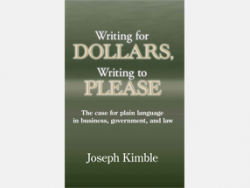Document Author
Year Published
Topic
- (-) Remove Plain Language filter Plain Language
- Plain Language & LEP (3) Apply Plain Language & LEP filter
- 100% Access to Justice (2) Apply 100% Access to Justice filter
- Forms (2) Apply Forms filter
- Forms (2) Apply Forms filter
- Reports, Evaluations, Best Practices, Surveys (2) Apply Reports, Evaluations, Best Practices, Surveys filter
- Research (2) Apply Research filter
- Simplification (2) Apply Simplification filter
- Best Practices (1) Apply Best Practices filter
- Best Practices for Self-Help Centers (1) Apply Best Practices for Self-Help Centers filter
- Reports (1) Apply Reports filter
- Self-Help Centers (1) Apply Self-Help Centers filter
- Trial Court Self-Help (1) Apply Trial Court Self-Help filter
Tags
Post date
Search results

Book: Writing for Dollars, Writing to Please The Case for Plain Language in Business, Government, and Law (Kimble 2012)
This book collects the empirical evidence supporting the value of plain language in business, government, and law. Professor Kimble summarizes 50 studies (no less) that show using plain language can save organizations and agencies a significant amount of ...

Report: A Comparative Readability Study of Plain Language Court Forms (Mindlin 2012)
This article presents the results from the first quantitative readability study of plain language court forms in the United States. Sixty citizens on a jury panel were selected to respond to brief questionnaires that tested relative comprehension of plain ...

Article: Focus Group: Connecting Writers of Legal Documents with Their Audience (Mindlin & McCormick 2012)
This article is about focus groups which are a qualitative research tool that tell you if the main message and purpose of your form are understood. It also tackles who uses focus groups, data analysis, number and location of focus groups to be conducted, ...